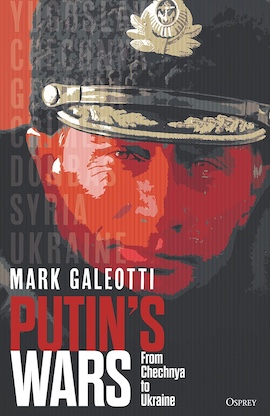SWJ Book Review – Putin's Wars: From Chechnya to Ukraine
Sean S. Costigan

Mark Galeotti, Putin's Wars: From Chechnya to Ukraine, Oxford and New York: Osprey Publishing, 2022 [ISBN: 978-1472847546, Hardcover, 384 pages]
The Russian military that invaded Ukraine in February 2022 revealed itself to be far weaker and more disorganized than many in the West had believed to date. In the years prior, Russian President Vladimir Putin had staked a considerable portion of his regime's legitimacy on rebuilding Russia's military strength through sweeping reforms and costly modernization efforts. However, as meticulously detailed in Mark Galeotti's timely book Putin's Wars: From Chechnya to Ukraine, Russia's military modernization was at best selective and incomplete, leaving core weaknesses, such as those that were exposed early in the 2022 invasion of Ukraine.
But beyond the headlines and current analysis, Putin's Wars gives the reader a thorough and enlightening exploration into Russia's military transformation over the span of several decades. This comprehensive work delves deep into the roots of Russia’s military transformation, tracing it back to the disintegration of the Soviet Union and Russia’s humbling (albeit initial) defeat in Grozny, which served as a wake-up call for a much-needed overhaul of the Russian military. There are in-depth profiles into the people and processes involved, giving the lay reader or seasoned military mind much to ponder or reconsider.
Galeotti provides an in-depth analysis of Russia's post-Soviet military reforms, intended to transform the decrepit force that emerged from the collapse of the USSR into one capable of achieving Putin's neo-imperialist ambitions. Galeotti passionately argues that the driving force behind this transformation is Vladimir Putin's vision of the military as the linchpin for a reinvigorated and more formidable Russia. Under Putin's focused leadership, the Russian military underwent a process of professionalization and modernization, designed to enhance its capabilities and adaptability. This visionary approach led to the development of advanced combat platforms, electronic warfare forces, long-range precision weapons and drones, and the emergence of a new class of professional soldiers. The book outlines Putin's crucial role in pushing through professionalization and investments in new technologies as well as capabilities like the Battalion Tactical Groups (BTGs) which performed well in smaller conflicts like the 2014 invasion in Crimea and Russia’s support of the Assad regime in Syria. Galeotti also offers many historical examples and analyses of Russia’s hybrid and cyber warfare efforts.
Critically, Galeotti does not shy away from acknowledging the many vulnerabilities that remain within the Russian military. For instance, he astutely highlights the selective and targeted nature of the modernization process, resulting in the emergence of highly proficient units within a larger framework of conscript and reservist forces, both of which still lagged in terms of adaptation. Putin's startling invasion of Ukraine in February 2022 brought an unexpected twist in the book's publication trajectory, causing a significant delay in its original publication date. The unanticipated interruption provided the author with a unique opportunity to incorporate the initial months of the invasion into the book's content, expanding its scope beyond the original coverage of the 2014-2021 Donbas conflict and the 2014 annexation of Crimea. This new material sheds needed light on the limitations that became evident during Russia's full-scale invasion of Ukraine.
In many ways, the Russian war against Ukraine war serves as a lesson in humility as military modernization and professionalization do not automatically translate into battlefield effectiveness. Reform, it seems, requires systematic overhaul across doctrine, training, and force structure, among other martial requirements. Russia's incomplete military revamp, while creating pockets of proficiency, left it unready for the initial “shock and awe” invasion and ongoing conflict Putin unleashed.
Nevertheless, Galeotti’s account of Russia’s two invasions of Chechnya ought to serve as a cautionary tale for those reading the tea leaves on today’s war in Ukraine. Russia’s first invasion of Chechnya was largely bumbling and resulted not only in crushing losses of Russian soldiers and materiel, but delivered a significant dent in prestige to Russia's army under Yeltsin. The second invasion of Grozny, however, was both decisive and damning: Chechen forces were largely destroyed under heavy bombardment, there were heavy civilian casualties, and Russia was able to declare it a military and political success after the installation of Ramzan Kadyrov, who remains in power to this day.
Russia’s invasion of Georgia is also revealing, both as a strategic effort by Russia⏤to prevent Georgia from growing closer to the West and joining NATO⏤and a tactically through Russia’s use of separatist conflicts in regions of Georgia, building on tactics Russia has repeatedly used to exert influence via proxy forces. Galeotti reminds the reader that Russia saw an independent-minded Georgian government under Mikheil Saakashvili as a threat to its regional influence, but the invasion also exposed some tactical deficiencies including weak communication and coordination between Russian military branches.
What truly sets Putin's Wars apart is its ability to offer a balanced and nuanced assessment of the strengths and weaknesses of the Russian armed forces. Galeotti's writing style is both informative and vibrant, making it accessible to a wide readership from military planners to students of history eager to grasp the intricacies of Russia's political and military dynamics. His insightful portrayal of the inner workings of the Russian Army grants readers a rare glimpse into the complex military-political landscape.
In conclusion, Putin's Wars: From Chechnya to Ukraine is a masterpiece and must-read for anyone seeking to unravel the leadership governing Russia, Putin’s motivations, and the intricate dynamics shaping developments in Russia, Ukraine, and beyond.
